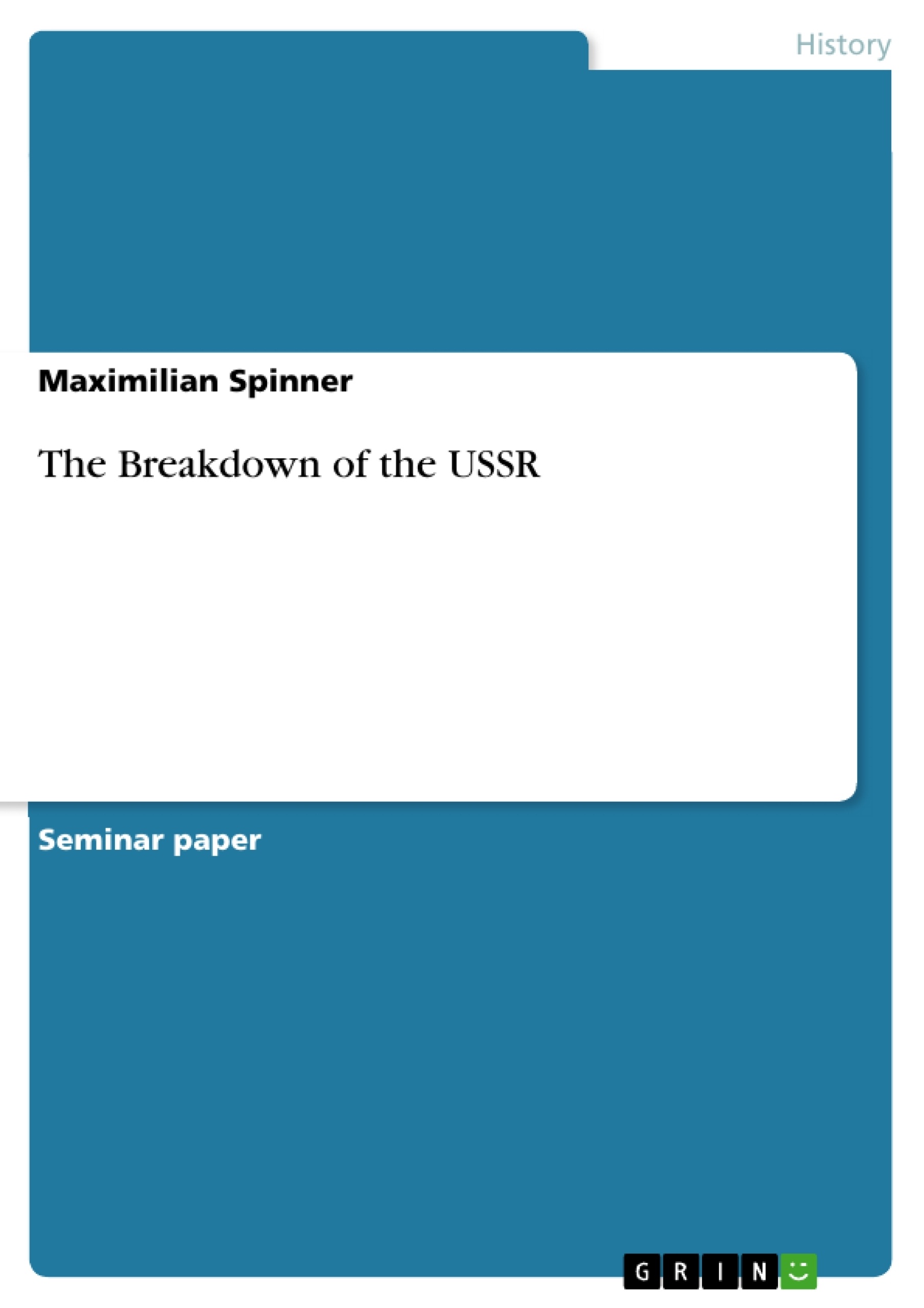The collapse of the Soviet Union has been one of the most controversially discussed issues
among historians and social scientists throughout the last decade. Paradoxically the imminent
collapse of communism had been predicted frequently by Western observers during the early
years of the Bolshevik rule. With the victory of the Second World War those voices were
muted and the West accomodated with the existence of an obviously stable, mighty and
economically expanding country.1 The breakdown of communism in 1991 had been
anticipated by few contemporary scholars, although the majority were aware of the symptoms
of a deep crisis.
In this essay I will argue that in order to better understand the collapse of communism
in the Soviet Union, a central role must be given to the economy and its effects on other areas.
Most symptoms of the crisis and the ultimate breakdown of the system can in fact be
attributed to the impact of economic failure. Whereas, economic modernization was the motor
of success in the early decades, the economy became the weakest link of the Soviet system in
the later period as its structural shortcomings deeply effected other areas as well.
The first part of this essay is intended to briefly outline the central role the economy
played in the development of Soviet socialism. The second part analyses the far-reaching
impact of the economic downturn, while the third part discusses the limits of reform before
drawing a conclusion.2
1 M Cox, ‘Critical Reflections on Soviet Studies’, in: M Cox (ed.), Rethinking the Soviet Collapse, L: Pinter,
1998, p 27.
2 The author is aware that in the given scope of this essay only a minor and not necessarily representatitve
fraction of the debates and works on the collapes of Soviet Communism can be touched on.
Inhaltsverzeichnis (Table of Contents)
- INTRODUCTION
- SOVIET RULE AND ECONOMIC SUCCESS
- SOVIET RULE AND ECONOMIC FAILURE
- Social change through modernization
- National awakening
- The industrial cul-de-sac
- Growing relative economic inferiority to the West and the loss of ideological appeal
- REFORM AND BREAKDOWN
- UNANSWERED QUESTIONS
- CONCLUSION
Zielsetzung und Themenschwerpunkte (Objectives and Key Themes)
This essay argues that the collapse of communism in the Soviet Union can be primarily understood through the lens of the economy and its effects on other areas. The essay aims to demonstrate the centrality of economic factors in understanding the crisis and ultimate breakdown of the Soviet system.
- The role of the economy in shaping Soviet socialism
- The impact of the economic downturn on various aspects of Soviet society
- The limitations of reform efforts in addressing the economic crisis
- The use of economic success as a substitute for democratic legitimacy
- The ideological dilemma created by economic stagnation and decline
Zusammenfassung der Kapitel (Chapter Summaries)
The essay begins by highlighting the central role of the economy in Marxist theory, with the ownership of the means of production dictating societal structure. In the Soviet context, economic development and control through the party were seen as crucial for the success of communism. The essay then traces the evolution of the Soviet economy, starting with the era of Stalin's modernization programs and the subsequent economic successes. This period witnessed rapid industrialization, collectivization in agriculture, and a significant rise in the Soviet standard of living.
The essay further examines the shift from economic growth to stagnation under Brezhnev, marked by declining growth rates and a growing ideological dilemma. The essay concludes by emphasizing the importance of economic success as a substitute for democratic legitimacy in the Soviet system.
Schlüsselwörter (Keywords)
The essay focuses on the collapse of communism in the USSR, emphasizing the role of economic factors. Key themes include economic modernization, economic failure, Soviet ideology, democratic legitimacy, and the impact of economic stagnation on the Soviet system. The essay also examines the importance of economic success as a tool for the Soviet government to maintain power and control.
Frequently Asked Questions
What was the primary cause of the collapse of the USSR?
The essay argues that economic failure was the central factor. Structural shortcomings in the economy eventually affected all other areas of the Soviet system, leading to its breakdown.
How did the Soviet government maintain legitimacy without democracy?
Economic success and modernization served as a substitute for democratic legitimacy. As long as the economy expanded and living standards rose, the system appeared stable.
What happened to the Soviet economy under Brezhnev?
Under Brezhnev, the era of rapid growth ended, leading to stagnation. This created an ideological dilemma as the system could no longer deliver on its promises of superiority over the West.
Did the West expect the Soviet Union to collapse in 1991?
While some early observers predicted it, most Western scholars after WWII were surprised by the sudden breakdown, having viewed the USSR as a stable and mighty global power.
What role did industrialization play in the early decades?
Rapid industrialization and modernization were the motors of success in the early Soviet period, providing the state with the resources and military power to establish itself as a superpower.
- Quote paper
- Maximilian Spinner (Author), 2002, The Breakdown of the USSR, Munich, GRIN Verlag, https://www.grin.com/document/13311



